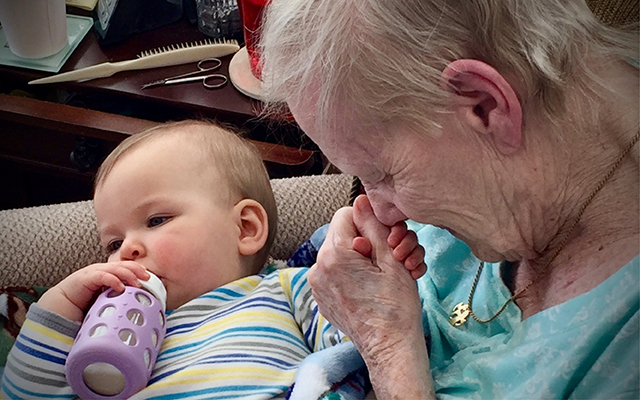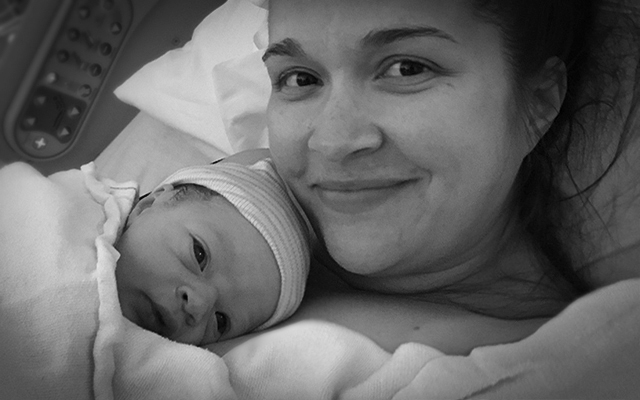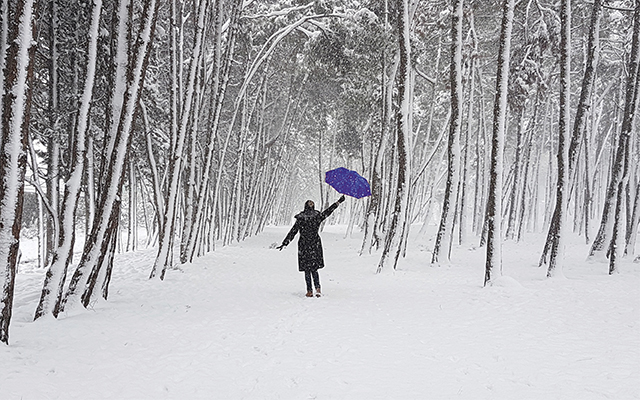My uncle Jeff passed away on April 9. Yet, I’ve only told a few people, maybe because sharing the news means facing the reality that our earthly conversations have ended. Or maybe because talking about his death means I’ll have to fully face all the difficult emotions of grief.
When my mom called me early Tuesday with the news, I cried. I shared my sympathies with her. Then I wiped away my tears and got the kids off to school. I went to a meeting that I couldn’t reschedule. That afternoon, I sat with my mom and listened. Later, my husband and I ate dinner with the kids, and laughed, danced, sang songs, and read books before bedtime. Then I went to the laundry room and sobbed.
Now, I’m sitting on a quiet patio in California, watching the fig trees sway in the breeze, and to my left, a squirrel jumps around on the branches, intruding on my solitude. All I can think is, Man, Jeff would’ve loved these trees. He also probably would’ve gone after that squirrel for being a nuisance — because Jeff could be both peaceful and rebellious, appreciative of nature but also ready to tame it.
His complexity fostered a barrier for me for most of my life, and it was only in these past few years that we connected. It was hard for me to understand the nuances of his personality growing up — Is he tough or loving? Is he fierce or tender? — and partly, that comes with youth: We flourish when there are clear definitions and expectations. My kids thrive on schedules and need rules for what kind of behavior is OK or not, and they see the world in terms of good and bad. It’s only when we’re older that we see the lines blurred and realize life comes with good and bad — and that people waver between both good and bad depending on the circumstances.
Jeff despised abuse of power, and he resisted authority and convention; like my grandmother, he championed the underdog. In high school in the early ’70s, he wore sandals and long hair and blue jeans to school, going against the dress code, but, as an adult, he kept a job at a hospital for 31 years and wore a uniform. He was honest and authentic and sussed out phonies. He was a captivating storyteller, a truth-seeker and truth-teller, even if you were ill-prepared for his realness. He was a boxer and won a welterweight championship in high school; he got in fights with strangers and his former roommate and best friend, once breaking his buddy’s jaw — but also cherished his friends and family, and, in his early 40s, fell in love with his wife, who cared for him as his health failed and was by his side when he passed at 63.
He once told me a story — and he had so many great ones that seem too unbelievable to print — about hitchhiking and hopping train cars as a kid to make his way out West. It’s unclear if there was a plan other than a great adventure, but he eventually found his way to Washington to pick apples in an orchard. As the train made its way through the mountains, Jeff said he looked at the range, the first time he had seen this kind of majesty, and felt such awe. “It was just beautiful, Cork. Really, just beautiful.” Even in telling it, I could see him recall that wonder. It moved me.
Surely, as a kid venturing into the unknown, he must have felt some fear, some hesitation, but he also embraced it because it came with life’s grace. Life and all its milestones, including birth and death, I’ve come to see, is so very complicated in its emotional presence.
It’s the lessons in grief that bring both good and bad: That person is no longer in pain, yet we are. That person is free, yet we are bound to the earth. We feel loss and heartache, yet we rejoice in remembering the better days.
Grief comes in stages for such a reason, I believe: We learn to carry on, even though we bear this sadness. We go through the Kübler-Ross grief model of denial, anger, bargaining, depression, and acceptance in moments and days and years, rather than allowing the thread to come loose all at once. In the 40th anniversary edition of Swiss psychiatrist Elisabeth Kübler-Ross’s groundbreaking book, On Death and Dying, it’s explained that the grief model should be viewed more as phases versus linear stages, and that we may go through some phases but not all — and they may overlap and be repeated over time. We compartmentalize grief so we can still be happy parents and workers and partners. It’d be nice if we could just stop everything and retreat to a place where we could process all the stages, but I’m not sure if that would eliminate grief. Maybe for some, like I learned in processing my birth trauma, it would re-categorize loss into something that simply has happened.
Or maybe we just always carry the good and the bad with us, and we start to see the intricacies as something to behold instead of control.
That, to me, is Jeff’s great gift and legacy.
Imagine how free you could feel to surrender to the unknown, and to marvel at the mystery in life. To revel in the glory of the mountain range, and the gentle breezes in the trees. Could you embrace your inner fighter and outer lover as the same person? Could you take pride in all your wonderful and terrible attributes without casting judgement? What would happen if you took your life’s plan and treated it like a rough sketch? What if we take the figurative train out West, with no idea where we’ll end up?
So here I sit, on the West Coast, reading one of Jeff’s favorite books, ready for the next adventure:
“What is that feeling when you’re driving away from people and they recede on the plain till you see their specks dispersing? — it’s the too-huge world vaulting us, and it’s good-by. But we lean forward to the next crazy venture beneath the skies.” — On the Road, by Jack Kerouac




This Post Has 0 Comments